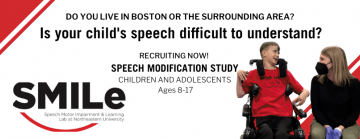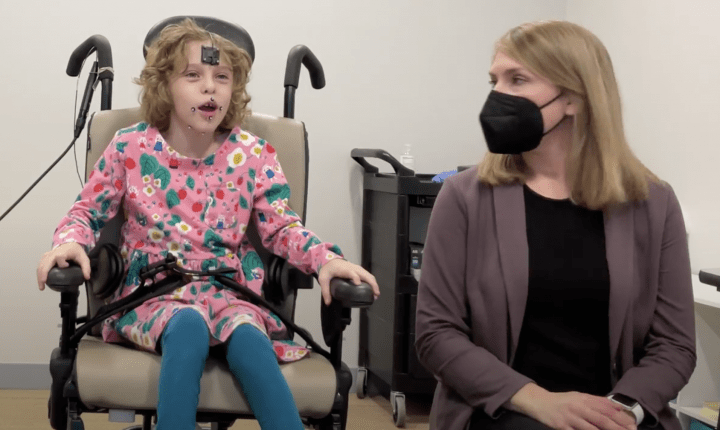
One way to increase speech intelligibility for speakers with dysarthria is through using speech modification strategies, such as by speaking with a loud voice, or at a slow rate.
RESEARCHERS NEED YOUR HELP on why and how these SPEECH MODIFICATION STRATEGIES can lead to improved intelligibility and communication in children and adolescents with dysarthria secondary to CP.

Our research seeks to address this gap by (1) Comparing the effectiveness of 3 speech modification strategies and (2) Identifying acoustic and kinematic markers that predict which strategies will be optimal for individual children and adolescents.
What Are Speech Modification Strategies?
Speech modification strategies are techniques that speech-language pathologists use to help people with dysarthria improve their speech intelligibility. There are a few strategies that have been shown to be helpful for children and adolescents with cerebral palsy who have dysarthria including:
1. Using a slow rate of speech. Slowing down speaking rate can help speakers produce speech sounds more clearly and precisely and give their communication partners additional time to understand their speech.
2. Using a loud voice. It’s not good for anyone’s voice to scream; but, projecting their voice with healthy loudness can improve intelligibility for some children with dysarthria.
3. Emphasizing key words. Some words in a sentence are more important than others to getting your point across. By focusing on emphasizing key words in a sentence, speakers can draw attention to and focus their effort on clearly producing the words most important to helping listeners understand their message.
How will the research be conducted?
This study involves 1 or 2 in-person sessions with our research team.
During the first session, children participate in standardized and informal speech and language testing. We also ask parents or guardians to complete questionnaires about their child's medical history, therapy services they receive, and communication skills.
In the second session, children are asked to repeat sentences using the three speech modification strategies. We attach small reflective stickers to the child’s face to track the movements of their mouth while speaking using a motion capture system. We also video and audio record the entire visit to gather data about the child's speech.
WHERE WILL THIS RESEARCH BE CONDUCTED?
The first session will take place at the home and the second session will take place in the SMILe Lab on the Northeastern University campus. If the family prefers, we can host both sessions in one day.
Eligibility:
Children and adolescents between the ages of 8 and 17, who meet the criteria listed below:
1. Have a medical diagnosis of CP
2. Have reduced speech intelligibility
3. Are able to repeat short sentences (at least 2-3 words in length)
4. Speak English as a primary language.
5. Have no reported hearing loss
6. Are within traveling distance of Boston, Massachusetts (Note: we will cover parking
costs for families to park in a campus garage or handicap accessible lot. We cannot reimburse families for other travel costs or lodging.)
COmpensation:
- Your child will receive a small, age- appropriate prize (valued at $10 or less).
- Parents/guardians will receive $100 after completing both sessions.
- Parking will be paid.
In addition, parents will receive a written visit summary after their child’s session that includes a description of their child’s performance on standardized testing and speech tasks completed during the session.
TO LEARN MORE:
Inquiries and questions related to this project can be directed to the lab email address:
smilespeechlab@northeastern.edu or Dr. Kristen Allison, the principal investigator, at 617-373-3697 or k.allison@northeastern.edu.

